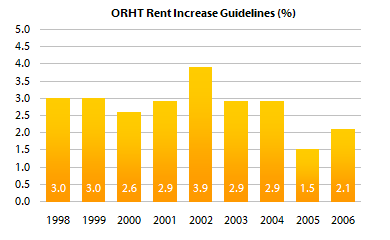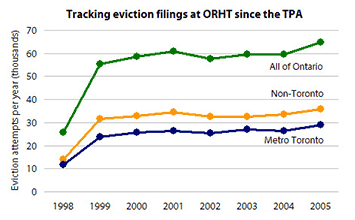'Smart metering' for apartments?
McGuinty Government Takes Good First Step with Smart Meter Initiative, CNW Press Release, 28 Feb 2006
Bill 21 allows the Minister of Energy to make smart metering mandatory for condominium units, but ignores rental apartments. Had the government included the metering of rental apartments, overall provincial electricity demand could be reduced by as much as 530 MW or enough energy to power over 331,000 homes. Toronto alone could have reduced demand by 210 MW or power for 125,000 homes...
Currently in Ontario, apartment and condominium buildings are the only areas where there is virtually no relationship between energy consumption and cost. Some 90% of apartment and condominium buildings (1.8 million suites) use a bulk meter for electricity consumption.
The building owner pays the bulk power bill and the cost is equally distributed to residents as part of their monthly rent or common area expense. Residents have no information about their energy usage and therefore no incentive to conserve. In effect, a minority of high energy users in apartments and condominiums have their electricity subsidized by a majority of users.
Stratacon, which issued the above release, would have made a lot of money if the 'smart' electricity meters they sell had been made mandatory. But how would tenants fare?
Conservation advocates such as Energy Probe - along with economists and salesmen - point out that unless tenants are aware of (and forced to pay for) their energy consumption, they lack the information and motivation necessary to make power-saving moves like switching to compact fluorescent light bulbs. They've got a point there, but consumption information and price-signal motivation won't solve the whole problem.
Most energy used in rental housing is consumed in heating, cooking, refrigeration, and (for a lucky few) air conditioning. Just knowing that my old fridge, stove, and baseboard heaters use a ton of electricity doesn't empower me to replace them. Moving from landlord- to tenant-billed hydro eliminates incentives for landlords to upgrade outdated, power-hungry appliances and heating systems or replace draughty windows with newer, better-insulated ones.
A fairer solution would be to allow sub-metering conversions only after landlords have met a minimum standard for energy saving retrofits or subsidized upgrades to their properties. Alternatively, major appliances and heating could be metered seperately from other outlets so that renters are only forced to pay for energy use that they can control.
Additional press: Toronto Star.






